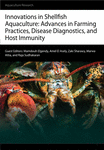Journal list menu
Export Citations
Download PDFs
Research Article
Open Access
oa
Hydrodynamic Optimization of Adjustable Scallop Dredge Systems With Negative-Angle-Arc Plates for Sustainable Benthic Trawling
- First Published: 26 June 2025
Research Article
Open Access
oa
Whole-Genome Sequencing and Functional Analysis of Klebsiella Strain mr-1S Originating From Macrobrachium rosenbergii
- First Published: 17 April 2025
Research Article
Open Access
oa
Evaluating the Protective Immunological Effects of Pandanus tectorius Leaf Extract Against Pathogenic Vibrio campbellii Using Gnotobiotic Brine Shrimp Model System
- First Published: 15 April 2025
Research Article
Open Access
oa
Harnessing Bacillus Probiotics: An Approach for Vibrio Pathogen Control and Organic Sludge Management in Shrimp Aquaculture
- First Published: 27 March 2025
Research Article
Open Access
oa
Silencing of EhAQP1, EhPTP2, and EhTK Genes in Ecytonucleospora Hepatopenaei Using RNA Interference: A Potential Strategy for Preventing and Treating EHP Infection in Shrimp
- First Published: 14 February 2025
Research Article
Open Access
oa
Impact of Commercial Probiotics on Growth, Prophenoloxidase, Superoxide Dismutase, and Digestive Enzyme Activity in Macrobrachium rosenbergii Cultured at Different Stocking Densities
- First Published: 29 January 2025
Research Article
Open Access
oa
Effects of Temperature on Reproductive Performance, Embryonic Quality, and Embryonic Development of Chinese Mitten Crab
- First Published: 27 January 2025
Research Article
Open Access
oa
Probing Pregnane-3,20-Dione, 17,21-[(Methylborylene)Bis(Oxy)]-, (5. Beta)- as an Antiviral Candidate Against White Spot Syndrome Virus (WSSV): Molecular Docking and Simulation Approach
- First Published: 15 January 2025




